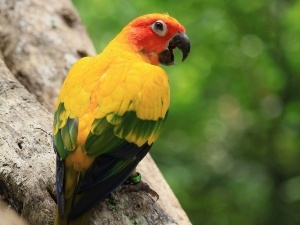
Keeping a conure, and keeping any bird for that matter, can be a full-time job. Birds need care and attention no matter what type of bird they are, conures included
This article explores the common beak problems that you should look out for if you’re raising a conure.
Table of Contents
Conure beak problems:
Your conure’s beak is very important to the bird. The beak helps your bird communicate and helps them eat. If any problems develop on the bird’s beak you’d be right to be worried.
Here are common conure beak problems you should look out for:
Overgrown beak:
Your conure’s beak is made up of a bony skeleton and a fleshy covering made up of keratin.
Keratin is the same material that our fingernails are made up of and just like our fingernails, the keratin on your conure’s beak is always growing.
In the wild, conures have access to a variety of rough surfaces to file their beaks with, this keeps the bird’s beak at a manageable length.
If your conure does not have access to anything to file its beak down with while living with you then the bird’s beak can become overgrown and start to look deformed.
What to do:
If your bird’s beak has already become overgrown then you would need to take your bird to the vet and have the beak trimmed down.
You can trim it down on your own at home but you may injure your bird if you do this
If you just got your bird then you can give the bird a cuttlebone. The bird can use this to file its beak down with.
You can also give the bird wooden toys which the bird can also use to file their beaks. These will help the bird wear the beak down
Flaking:
The keratin on your bird’s beak may also flake off, and this will look like peeling or flaking on your conure’s beak.
This is also normal and is nothing to worry about, the keratin on your bird’s beak can flake once it gets too old, the flaking is the beak’s way of molting the old layer off and making room for a new layer to grow.
What to do:
This flaking is normal and natural, you don’t have to do anything to help in this case apart from giving the bird rough surfaces to scratch its beak against to get the flaking off.
Do not try to remove the flaking yourself.
Discoloration:
A change in your conure’s beak color is also something that you should look out for and be concerned about.
Reasons for your conure’s beak discoloring include malnutrition and accidents.
What to do:
If you think that your bird’s beak is becoming discolored because of malnutrition then have a look at what your bird is eating.
These birds should be eating a pellet diet and this should make up 60-70 percent of the bird’s diet. Supplement fresh fruits and vegetables into your bird’s diet.
If this is what you’re doing and the bird’s beak is still changing then you may need to take your bird to the vet as the bird may have absorption problems for some reason.
Too fast growth:
If you’ve just started raising your bird, and the bird’s beak seems to be growing much faster than normal then your bird may have fatty liver disease.
Other signs of this ailment include black spots developing on the bird’s claws, brittle feathers, diarrhea, seizures, a loss of appetite, and a soft and misshapen beak.
It could be caused by a high-fat diet, nutritional deficiencies, genetics, or a lack of exercise.
What to do:
Taking the bird to the vet if you suspect that your bird has fatty liver disease is recommended.
Once diagnosed treatment will be recommended and this treatment may include a change in your bird’s diet.
Fungal infection:
Fungal infections can affect different parts of your bird’s body, this includes your bird’s beak.
Symptoms of a beak fungal infection in your conures include a discolored and sore beak. A white patch will develop at the bird’s beak, this is where the yeast has overgrown.
What to do:
Taking your bird to the vet if you suspect that the bird has a fungal infection is recommended. The vet will be able to diagnose your bird and recommend antifungal treatments.
If you enjoyed this article then you may also be interested in other bird related articles. Here are some articles that you may be interested in: Why Is My Bird’s Beak Cracking, Conure Beak Cracking, Cockatiel Rubbing Vent, Will Male And Female Budgies Always Mate, Bird Poops In Food Bowl, How Do I Know If My Budgie Is Eating Enough?, Pigeon Vomiting Green, Why Is My Parakeet Laying In His Food Dish

